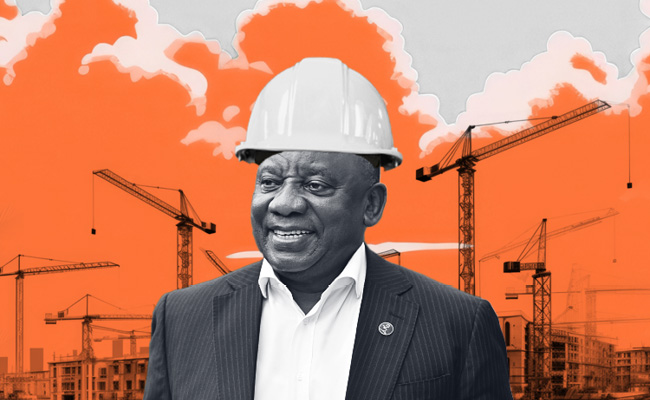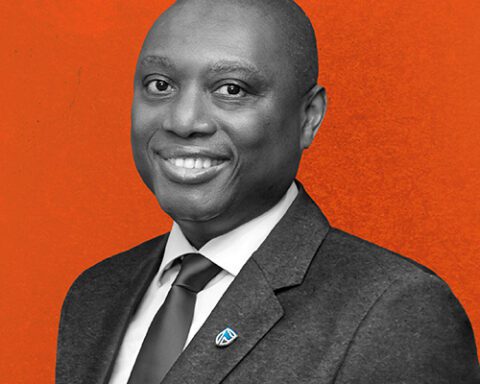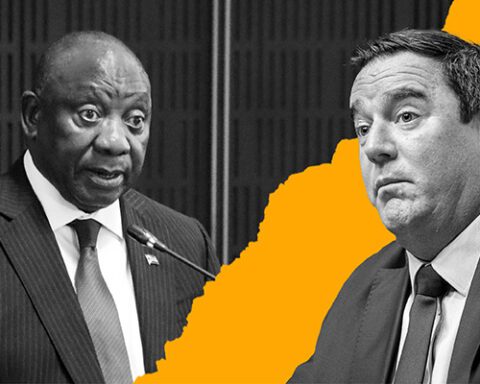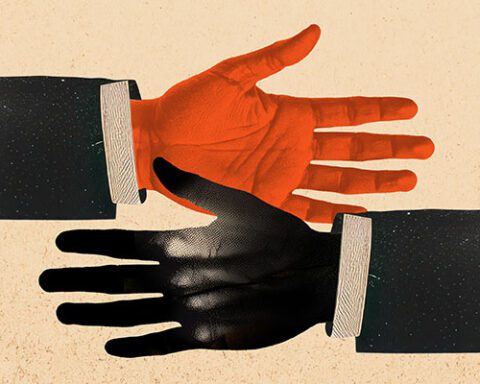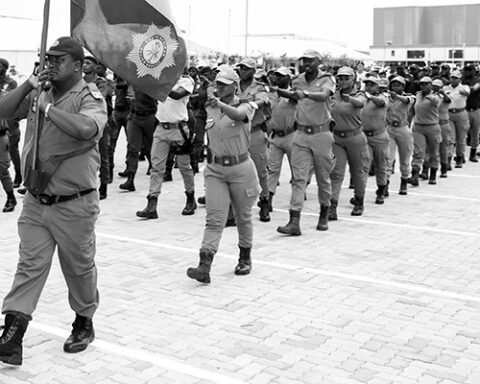If you’d listened to President Cyril Ramaphosa’s opening of parliament address in Cape Town’s City Hall on July 18 and thought you’d heard it before, you wouldn’t be entirely wrong. Jobs, visas, power, infrastructure, it was all there, just like last year, and the year before.
And yet this time, the tenor really was different. Probably for the first time since his very first address in 2018, it actually seems possible.
The dead yoke of ANC “consensus” has been lifted from Ramaphosa’s neck and, instead, he committed to a list of priorities thrashed out during a weekend cabinet lekgotla which placed the economy at the very heart of the government’s programme.
“We have a clear intention to turn our country into a construction site,” he said. “We want to see yellow equipment throughout our country and cranes [with] roads being built, as well as dams, bridges, houses, schools [and] hospitals.”
It’s a visually arresting image that contrasts immediately against the shuttered construction sites that became commonplace during Covid, reviving memories of the era of Thabo Mbeki, when the country was growing at 5%, and buildings were sprouting weekly.
But Ramaphosa has provided such fodder before; who can forget the bullet trains he so fancifully proposed in 2018, even as the country’s passenger rail service had ground entirely to a halt, having bought ill-suited and overpriced trains from the Chinese?
This time, however, it really is different. Here’s why: a day before Ramaphosa’s speech, Dean MacPherson, the DA’s new minister of public works and infrastructure, had stood up in parliament and revealed his plans to vastly boost state-led construction.
“I want to bring a new hope to our country that will see the department of public works and infrastructure playing a leading role in growing an inclusive South African economy through infrastructure-led growth,” he said.
Rather than jealously hoard all state infrastructure projects, reluctant to cede anything to the business sector, MacPherson promised to attract R10bn in “direct private sector investment” through new transport, communications, water and energy projects.
His ambitious goal includes more than doubling South Africa’s ratio of gross fixed capital formation – jargon that essentially means tangible assets, like roads, railways, hospitals, schools and equipment – from 14% of the country’s GDP to 30%. It’s an immense shift.
In his speech, Ramaphosa reinforced and expanded upon what his new DA minister had said earlier. It’s an indication that not only does the president intend to deliver on a vital economic promise; it’s a sign that his new unity government cabinet is pulling in the same direction.
Indeed, it was a bracing moment when, after Ramaphosa’s speech, the usual suspects who would previously have lined up to highlight his shortcomings – like the DA’s John Steenhuisen or the IFP’s Velenkosini Hlabisa – instead gushed over this “moment”.
‘Open arms’
“We welcome with open arms the acknowledgement that growing the economy is the starting point to fix so many social ills and create a just and equal society,” said Steenhuisen. “We will continue to be builders, not breakers.”
Ramaphosa himself invited this comparison, ending his speech by referring to the unity government as akin to a community of weaver birds, which build complex structures together and co-operate for the greater good.
“There is change in the form of governance and reform that leads to the economy growing, with more investment attracted, leading to the reduction of unemployment, inequality and poverty,” he said.
Unlike Ramaphosa’s earlier state of the nation speeches, this was unwaveringly focused on the economy. It was about building, fixing and maintaining, and he planted a flag above such commendable achievements as the R400bn already committed for private sector investment in new renewable energy projects, which will deliver 22,500MW.
Even on National Health Insurance – one of the least well-conceived “solutions” in an ANC renowned for misdiagnosing remedies – Ramaphosa suggested a compromise was in the offing.
“We are confident that we will be able to bring stakeholders together, and that we will be able to resolve differences and clarify misunderstandings,” he said.
This, of course, will infuriate the ideologues in his party, who have never been much seized with the practicalities of affording a system that, economists say, will lead to a massive hike in payroll taxes, or necessitate a VAT hike from 15% to 22%.
But then, Ramaphosa isn’t solely answerable to the ANC alone now; he’s answerable to a government of nine other parties, many of which are far more seized with the practicalities of dealing with an unemployment rate that is a scarcely believable 32.9%.
“While on the surface the speech contained little new, given the lack of detailed policy agreement between the parties of the [unity government], it contained important commitments to unblocking growth,” said Peter Attard Montalto, MD of financial consultancy Krutham.
It was, of course, just a speech but, as Attard Montalto said, it will “allow the continued restocking on goodwill on South Africa” that began the day after Ramaphosa announced his new cabinet.
Goolam Ballim, Standard Bank’s chief economist, said the trend of drawing in the private sector “will likely be amplified in the unfolding administration, out of sheer execution and balance sheet necessity”.
The ANC, as he pointed out, garnered just 40.2% of the vote. The economy – particularly the suffocating impact of the electricity blackouts – was the main reason the party lost its majority.
Yet that has turned out to be quite good news indeed if this address is any sign. Ramaphosa is a master of cosy, cotton-wool speeches that touch all the right areas. But this time, perhaps for the first time, the former trade unionist delivered a set of promises that seemed believable.
Top image: Collage of Cyril Ramaposa. Thomas Lohnes/Stringer/Getty/Currency.
